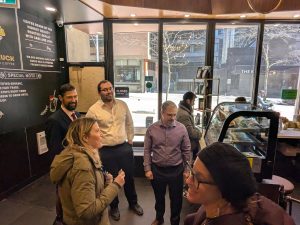In a small city like Sudbury, Ont., where I live, we sometimes trick ourselves into believing that the Jewish community is more unified than it really is. Because we’re so small, we don’t have the luxury of fractioning. The only way we stay afloat is by sticking together.
So it’s always a bit of a shock when I go to a bigger place and realize that many Jews don’t consider us to be part of their community, or, in some cases, don’t consider us Jewish at all because of the branch of Judaism I converted through. The sadness hits me every time. Each of us is already part of a minority; do we really need to classify ourselves so narrowly?
It’s therefore been a balm to my soul this past year to see my son’s Hebrew school teacher appear on the screen every week. He has always gone to Hebrew school online, as he’s the only child of his age group in our congregation. His classmates come from other small communities and they are also familiar with being the only Jewish kid in the class, or on the hockey team, and the only kid with matzah in their lunchbox when everyone else is eating Easter eggs. The online format has allowed him to feel a sense of connection to the broader Jewish community, a feeling he’d otherwise only get at camp.
Prior to this year, his class worked with a teacher in the United States who my son adored. It amazed me how attached he became to someone who he never saw face-to-face. When the teacher was unable to continue due to his heath, it was a loss. I wondered if my son would ever feel that sense of attachment again. How motivated would he be to continue his online coursework without his buddy to encourage him? We got our answer this past September, when we were introduced to his new teacher, Shira.
Although American by birth, Shira lives in Israel and always comes to class with her head covered. She’s clearly had an excellent Jewish education, but she’s able to break things down to a level that my active nine-year-old can understand and even enjoy. She has the kids digitally draw their favourite part of Shabbat and asks them bring their tzedakah boxes to show each other onscreen. She comments on their work, shows them funny videos and manages (in what can only be described as a miracle) to keep them on-task for a full hour a week. Her enthusiasm for Israel and her anecdotes about daily life there mean that for my son, it’s become a real place for the first time.
READ: HOW BEING A SMALL TOWN JEW MADE ME RELIGIOUS
I’ve tried to analyze why this long-distance relationship is so meaningful to me. Do I need the approval of someone who’s Orthodox and Israeli to feel validated as a Jew? I began my conversion process in an Orthodox community, so it’s not as though Shira is the first Orthodox Jew I’ve ever met, nor is she the first Israeli. I’ve had a hard time putting my finger on why she’s had such an impact on me.
I think it may have something to do with the fractioning we so often experience in the Jewish community, that sense of not being quite right, of being a Jew out of joint. We’re very good at identifying our differences and not so skilled at finding the areas in which we overlap. During their weekly class, Shira helps us push back against those divisions. She accepts my son, she teaches him and she lets him into her Judaism for a while. By sharing her experiences, she connects us to Israel in a way that wouldn’t otherwise have been possible for people living in a small northern Ontario community. She puts what binds us together ahead of what could keep us apart and for that I am enormously grateful.
Author

Emily Caruso Parnell lives in Sudbury, Ont. She is a full-time arts educator, a part-time ballet teacher and a volunteer synagogue president.
View all posts







